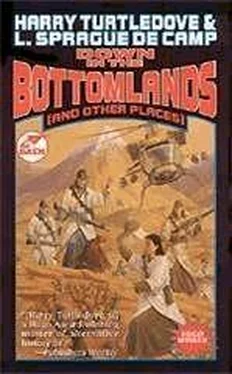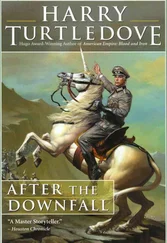“La ikraha fi’l-din,” Park answered: “ ‘There is no compulsion in religion.’ ”
“You even quote the holy Qu’ran at me.” Muhammad shook his head. “I find that your precedent has some validity.” Muawiyah let out a howl of outrage; Ankowaljuu, and a moment later Waipaljkoon, cheered. “Be still, all of you,” the qadi said sternly. “More learned men than I must make the final decision in this case. Until they do, I — declare these two Tawantiinsuujans People of the Book, under the protection of the Christian qadi here. If I am overruled, however, they shall become the property of the airwain pilot Muawiyah. I have spoken.”
“Now what?” Park asked him.
“Now I send you on to my more learned colleagues, which means, in the end, on toward the court of the Emir, Allah’s blessings upon him.” The qadi ’s eyes were shrewd. “Which, no doubt, is what you had in mind.”
“Who, me?” Park grinned at Muhammad ibn Nizam. It was always easier to do business with someone who understood him.
“You did that aforethockly,” Ankowaljuu said the next day as they jounced along in one of the Emirate’s military goodwains toward its ruler’s headquarters.
“Did what aforethockly?” Park asked. They used English for privacy’s sake; had Park been in Muhammad ibn Nizam’s shoes, he knew he would have salted away a Ketjwa-speaker or two among the guards who made sure nobody tried diving out over the rear gate. Park had no intention of escaping but, since he’d fallen into the Emirate’s hands in the company of two enemy citizens, was certain the Moors would not believe that.
“Had me make that faithly writing,” Ankowaljuu said. “You never planned to change to Patjakamak — you wanted the writing to show the Muslims we Tawantiinsuujans are People of the Book.”
“Who, me?” Park said, just as he had to the qadi.
“Aye, you, and don’t naysay it, either. You made me so hopeful of the ghostly good coming to you that I forgot to think straight through, as a tukuuii riikook ock. But tell me this, Thane Ready-for-Aught: how were you thinking of getting the writing to the Muslims had we gone on to the Son of the Sun as we reckoned we would?”
“I’d have had you take me over the lines,” Park answered calmly.
“I’d nay do that!”
“Oh yes, you would, if you’re as hot for peace as you say you are. The best chance to get it is to show the Muslims you’re no heathen country, but earnful of being treated like other folk with a godshown faith. I’d have talked you into getting me over there, all right, never fear.”
“You just might have,” Ankowaljuu said after a pause in which he seemed to be examining his own feelings. “I thock I was good at fingertwisting men into doing what I want, Judge Scoglund, but I own I’ve met my thane in you.”
“That’s sooth,” Eric Dunedin put in. “He even got me to learn Ketjwa. He’s the slyest man I ken for-”
Park never did find out why Monkey-face thought he was so sly. Just then, a beetle almost the size of a kitten flew into the goodwain’s passenger compartment. Christians, Patjakamak-worshipers, and Muslims spent a couple of frantic minutes knocking it down and squashing it. By the time the remains were finally scraped off the floor and tossed out, the conversational thread was broken.
When they arrived at the base from which the Emir was directing his war, Park did not find the Arabian Nights-style encampment he had half expected. Instead, the neat rows of mass-produced shelter tents reminded him only of the Vinlandish camps he’d seen the year before. The Industrial Revolution, even this world’s less complete one, inevitably brought industrialized warfare with it.
He had hoped he and his companions would be whisked straight to the Emir, but that did not happen. Muhammad ibn Nizam led them to a qadi he knew, one of hardly higher reputation than himself. That judge listened with the same skepticism Muhammad had shown, and only slowly came round to reluctant acceptance of the possibility that the Tawantiinsuujans might have had some long-ago share of divine revelation, however much their current doctrine distorted it. Ankowaljuu bristled at that; Park could not even kick him under the table, as they were sitting on rugs again instead.
The qadi said, “How ancient are these beliefs of yours?”
Park knew the cult of Patjakamak had sprung up in the fourteenth century. Before he could answer, though, Ankowaljuu said proudly, “They date from the time of the creation of the world, thousands upon thousands of years ago.”
“Hmp.” The qadi gave an audible sniff. “There were many prophets before Muhammad. Maybe one did indeed visit your folk, unlikely as I would have thought it. Had you told me your religion grew up after the Prophet’s time, I would know it for a sure falsehood, as he was the seal of prophecy… You said something, Judge Scoglund?”
“Nothing, Excellency.” Park swallowed a gulp. He had forgotten about that detail. A good thing Ankowaljuu had been irritated enough to interrupt with that bragging, he thought, or all his plans would have gone down the drain.
“Please let us deliberate by ourselves for a time now, Judge Scoglund,” Muhammad ibn Nizam said.
“Why? I am judge, too.” Park was anything but happy at having the two qadis decide things without his being there to see to it they decided his way.
But the other religious judge said pointedly, “You may be a qadi of qadis among Christians, Judge Scoglund, but you are not a Muslim.” Park knew a warning to back off when he heard one. He got out, taking Ankowaljuu with him.
“Even if they do ontake us as Folk of the Book, they’ll still be as faithproud as ever,” the tukuuii riikook said while they waited and worried. “You are a Wick of the Book, and look how the qadi brushed you aside. We and they will still find grounds for ficking each other.”
“I don’t doubt it,” Park said.
“What then?”
“If you’re Folk of the Book, that makes you a civilized country-”
“What kind of country?” Ankowaljuu asked. “I don’t know that word.”
“Huh? Civi — Oh.” It was a wonder, Park thought, that he didn’t absent-mindedly use his native brand of English by mistake more often. “A burgish country, I mean, in Muslim eyes, not a bunch of savages to be fickt whenever the mood takes the Emir, and surely not a fit dumping ground for ghazis who’d likely be in jail if they weren’t out hunting heathens.”
“I hope you’re rick,” Ankowaljuu sald, “because if you’re not-”
Muhammad and the other qadi came out of the tent. The more senior judge looked as sour as if he’d been sucking on a lemon, but he said, “Come with us. We’ll lay your case before the Emir’s qadi, to let him make the final decision.”
Getting in to see the Emir’s qadi took most of the afternoon, though he did not seem that busy. He was one of those important people who show how important they are by making everyone else wait. His name, Muhammad ibn Nizam told Park, was Uthman ibn Umar.
Park’s heart sank when he was finally led into Uthman’s presence. The chief qadi was an ancient man whose hair and beard were white but whose bushy eyebrows somehow remained defiantly dark. The deep-set eyes that glittered beneath those brows were also dark, and as unyielding as any Park had ever seen. Convincing him of anything new was not going to be easy.
“Well, what is it?” Uthman asked peevishly.
By way of answer, Muhammad ibn Nizam handed him the sheets Ankowaljuu had composed. He put on spectacles and began to read. “You know Ketjwa?” Park said in surprise.
Читать дальше












